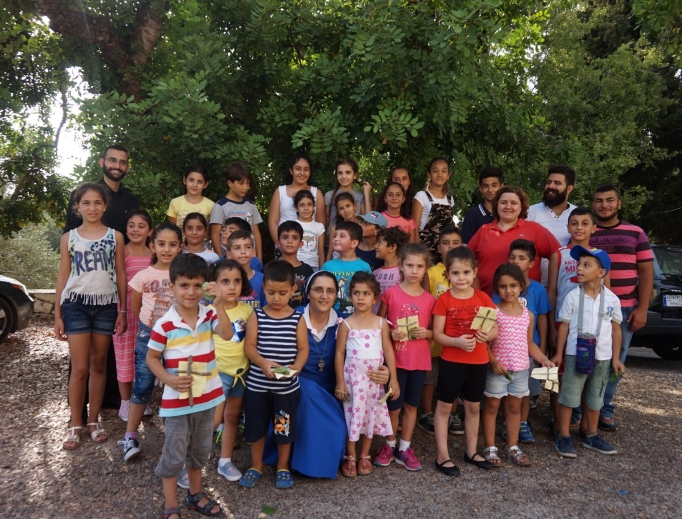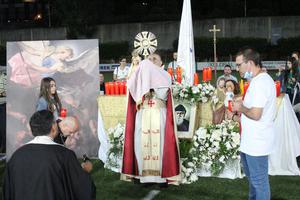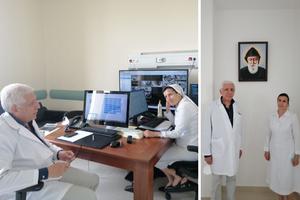Summer Mission in Lebanon: Building Up the Body of Christ
A five-day event gathers nuns, priests, seminarians and lay volunteers to minister to seven parishes of the Maronite Catholic Church.

JBEIL, Lebanon — Every summer the Maronite Catholic Eparchy (diocese) of Jbeil, Lebanon, carries out an outreach mission aimed at implementing the word of God in the daily life of parishioners and building up the Body of Christ.
The five-day “missionary camp” gathers nuns from the Missionary Sisters of the Very Holy Sacrament — a Maronite order, distinguishable by their royal blue habits — with priests, seminarians and lay volunteers, who minister to seven different parishes.
Together, the missionary team prepares the camp, which involves daily sessions geared to children and teens, with a discussion group for adults in the evening, preceded by Mass for the entire parish.
The theme for this year’s mission, which concluded at the end of July, was “Let Our Family Be a Church.”
The convent and school of the Missionary Sisters of the Very Holy Sacrament in Beit Habbak, Jbeil serves as “home base” for the team throughout the mission. Divided into smaller teams, the group disperses each day to their assigned parishes.
“We’re living together as a family and experience the richness of giving our whole self to the mission despite the differences between us,” Sister Maguy Adabashy told the Register, referring to the mix of ages and vocations in the group. Day-to-day responsibilities are shared. Several retreats also precede the mission.
Tatiana Chayban, 14, was the youngest of the group of 20 volunteers in this year’s program. Last summer, the mission came to her parish in Annaya, the village where St. Charbel’s tomb is located. “It really leaves a mark on your heart,” Chayban said of the camp. “I enjoyed it so much, I decided to volunteer this year,” she added.
“Here, there’s love. We’re really like one big family,” she told the Register.
Chayban recounted that, upon her arrival at the convent, she and some of the participants were feeling a little overwhelmed about the mission ahead. “But the nuns told us, ‘God will be there. He’ll go before you.’”
Through her experience with the mission, Chayban has discovered that she enjoys working with children. Aside from the self-confidence she is gaining, “I also feel like my faith is growing stronger,” Chayban said.
In keeping with the Eucharistic mission of the Missionary Sisters of the Very Holy Sacrament, the team prays before the Blessed Sacrament in the convent’s school chapel before heading out for each day’s mission.
“We have to take power from God to work so we can do the mission for God and with God,” pointed out 35-year-old Maroun Bou Khalil, who is a fifth-year Maronite seminarian.
Bou Khalil also recognizes the importance of nuns, priests, seminarians and laypeople working together as a team. “If we are a team, the Holy Spirit can make us a missionary [group],” he said. “If each one of us is for himself, it’s not a good mission for Christ.”
At the end of the day, the missionary team regrouped at the convent to share about what they experienced throughout the day in ministering to mission participants.
Preparation for Priesthood
Gilbert Jajem, a third-year seminarian, told the Register he especially appreciates the communication skills he is developing through the mission, which will help him in his future vocation.
“The father’s role in the family is to listen, to protect, to help his family grow and develop. It’s the same in a spiritual way for a priest,” Jajem, 21, explained.
“A priest should be among the people. He needs to know their problems, their difficulties,” the seminarian said. “When you listen to others, you feel their pain.”
Jajem recounted how, during one of the evening sessions of the mission, a woman shared that her daughter was paralyzed and later died. “I saw her tears. She was questioning why God took her daughter. I saw this woman so lost. It’s the first time a woman cried to me. It touched my heart.”
The future priest said he told the woman: “The first thing God needs is our soul. We’re here on earth for a temporary time. The important thing is salvation.”
Jajem said he also feels encouraged because “I see that people have a real thirst for the word of God.”
Father Rony Bou Gharios, the spiritual director, sees the mission as an important step in seminary formation. “The future priests need to have contact with people. It helps them in their future parishes,” he said, noting that they could possibly serve one of the parishes.
The Jbeil Eparchy, north of Beirut, has a total of 84 parishes, many of which are located in small villages in the mountains. The Beit Hebbak convent of the Missionary Sisters of the Very Holy Sacrament, for example, is situated at an altitude of 1,770 feet above the coastal town of Amchit, just north of the ancient seaport of Jbeil, also known as Byblos.
The eparchy is rich in history. Some of its churches date back 1,000 years or more.
Helping Children to Know Jesus
The mission’s children’s program opens with a song focusing on the camp theme, as team members engage the children in hand motions to match the lyrics: “Make our family a church … so that through the grace of Our Lord each one will become saints.”

“It’s very important for the children to know Jesus now, because otherwise it will be hard for them when they grow up,” Sister Samar Ayoub told the Register.
Activities include making crosses from twigs found on church grounds; relay races; a piñata brimming full of Bible verses; and creating an illustration for “I am the vine, you are the branches,” with pictures of each child depicted as grapes dangling from real vines and leaves.
“Sometimes the leaves become yellow,” a volunteer explained. “That means we need something, maybe more water: the word of God.”
At Mass following one of the children’s sessions at Our Lady of Beit Habbak Church, a child brought a vase filled with the vines to the altar during the Offertory. Sister Samar announced, “We are offering to God the vine with pictures of the children as a symbol of our attachment to God, the source of life.”
The ambience of the mission also fosters participation and dialogue.
After Mass, a young mother approached the priest when he left the altar. With an open missal, she asked him about one of the readings. He took the time to explain to her, which elicited further questions. Simultaneously, preteen girls started a discussion with Sister Samar.
‘Let Our Family Be a Church’
That evening, as typical for the seven parishes covered in the mission, adults gathered in the home of a parishioner while the teen session took place in another location.
Lively chatter filled the living room as 25 or so participants — mostly women — settled in. The priest opened with a prayer.
Introducing the topic, the seminarian read a section of 1 Corinthians that talks of the roles of family members.
When he asked, “How are our families like churches?” and “What is your role in the area of faith?” participants were quick to contribute. “The role of the father is important,” said an older woman. “No, the mother and father are both important,” a fellow parishioner replied. Another woman said, “I can’t oblige or force my children to go to church. In my opinion, the family must — all together — go to church. Children imitate their parents.”
The seminarian then posed another question: “What makes us united?” and answered, “The Holy Spirit.”
When the future priest stressed that love is very important in families, a woman responded: “How can I know love when I’m not helping others or forgiving others or being merciful with others? Love is a big word.” The seminarian noted that even when love is lacking in families, “each family has saints” and that the Holy Family should be our role model. He advised seeking guidance from the Church “to save our families.”
One of the nuns reminded the participants that during the consecration at Mass, “the bread and wine become the Body and Blood of Jesus.” Likewise, she pointed out, “When a man and women get married in the church, they will also become sacramental.”
When it comes to problems in the family, “We all blame each other,” a woman remarked. “Each one of us should start with ourselves,” the nun responded.
Then as a wrap-up to the evening’s discussion, the nun presented a simple boat constructed from a piece of paper, origami style.
“This is the ship of life,” she began. Tearing one end of the boat, she said: “Problems are breaking the ship. But the ship is continuing on its route.”
“And now this ship …” she continued, as she unfolded the paper vessel so it is transformed distinctly into a church building with a cross on its roof, “this Church, is Jesus, when he died on the cross.” She unfolded the paper again, and it formed a cross with an opening in the center.
The nun concluded, to applause from the parishioners: “This window is to see each one of us, helping each other through the cross. All together, we are the Body of Christ, and this ship is the Church.”
Register correspondent Doreen Abi Raad writes from Beirut, Lebanon
- Keywords:
- doreen abi raad
- maronite church
- new evangelization

















